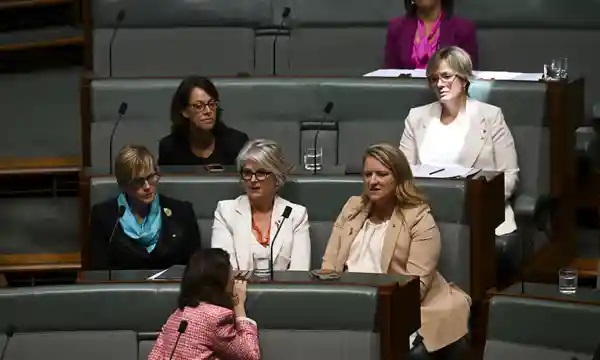National Anti-Corruption Commission to be established in mid-2023 after legislation passes parliament
A National Anti-Corruption Commission (NACC) will be established in Australia for the very first time after the government’s legislation passed federal parliament.
Introducing a federal ICAC to tackle corruption was a core promise by Labor at the election earlier this year.
The bill was passed by the Senate on Tuesday night with several amendments, which were approved by the House of Representatives on Wednesday afternoon.

Prime Minister Anthony Albanese and Attorney-General Mark Dreyfus said the body will be established midway through next year.
“This is a historic day for our parliament, and the nation,” they said in a statement.
“The government has already begun the search for Australia’s first National Anti-Corruption Commissioner through a merit-based, transparent and robust recruitment process, adhering to the highest standards of integrity and accountability.
“With today’s vote, we now look forward to the establishment of the National Anti-Corruption Commission in mid-2023.”
Greens leader Adam Bandt said on Tuesday the legislation had passed with two Greens amendments and came “after more than [a] decade of pushing for an anti-corruption watchdog”.
“Now, the big work to clean up the corruption of the last government begins.”
The Greens said the bill included amendments to give an inspector the ability to provide real-time auditing.
Other crossbench amendments, including to lower the bar to make NACC hearings public, were blocked.

“This bill gives the NACC extremely broad powers to compel witnesses to answer questions and to force the production of documents, and with this comes the need for a fully empowered Inspector to be a check on any potential misuse of these powers,” Greens Senator David Shoebridge said in a statement.
“The fact that many of the hearings of the NACC will be entirely private because of the exceptional circumstances test, means an empowered Inspector is particularly critical.
“In the absence of more transparent public hearings, witnesses who come before the NACC need to have access to an empowered Inspector if they have been improperly questioned or denied procedural fairness. These [amendments] give them that right.”

Crossbench MP Helen Haines welcomed the new legislation.
“What a huge win in the fight to improve standards and restore trust in politics,” she tweeted.
“This is the result of years of work and I am so proud it is finally a reality.”
Independent Senator David Pocock hailed the bill’s passage as a “historic moment for Australian politics”.
But he also criticised the major parties for coming together to block some of the crossbench amendments, such as explicitly including pork barrelling and removing the “exceptional circumstances” barrier to public hearings.
“The major parties just voted to allow former politicians to be the NACC Commissioner or Inspector,” he said, on Twitter.
“The crossbench raised concerns about a former politician overseeing a body that is meant to investigate corruption, including corruption by politicians.”
Watt defended the government’s choice to maintain the “exceptional circumstances” requirement for public hearings.
“I accept that there are groups in the community that think that there should be public hearings in every instance,” he said.
“I also accept, and I don’t know whether the senators asking these questions accept it, that there are people who don’t support that. And what we have tried to do is to strike a balance.
“I’ve already given the very good reasons why it is not wise to provide the commission with a default public hearing power but they do have the powers to go down that path if they choose, if they decide there are exceptional circumstances that warrant it.”








